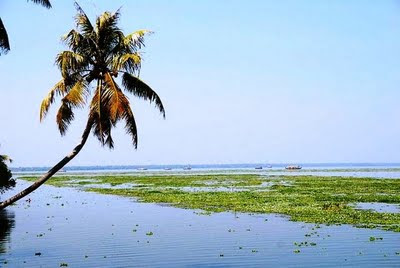Vaikom is a small town, but one of the oldest in
The place is also prominent in history for the Vaikom Satyagraha (1924-25) led personally by Mahatma Gandhi. The objective of the agitation was to secure the right of passage for all sections of people along the roads around the temple. At that time the lower castes were not permitted on those paths.
For me personally, the importance of Vaikom was the old travelers’ bungalow by the lakeside. It had two large bedrooms with attached dressing rooms and bathrooms and a veranda with a porch in front. The building, set among some rain trees, had a high, tiled roof.
Decades back there were hardly any hotels except in major towns. But a string of Government-run travellers’ bungalows (TBs) provided people with clean and safe places to rest during journeys. Though the rates were very cheap, only upper class folks used the facility in those days.
Before a road was laid to my place, Olavipe, our journeys were mostly by scheduled boat service. Boats plying between
I mentioned scheduled boat services, but the vessels did not keep to the prescribed timings. Arrivals and departures were subject to tide and wind (though the crafts were motorized) and other factors. But for us, onward journeys did not pose a problem except for some waiting at Poochakkal.
While coming back it was different. After reaching Vaikom sometimes one had to wait for hours for the boat from Alleppey to arrive. And the place to while away the time was the TB. The front porch had one or two planter’s easy chairs and other seats. Lean back and relax. Enjoy the lovely breeze that blew in from the lake and the beautiful scenery.
Very rarely have I come across other travelers at the TB. Not many people used that route. Every now and then the ‘watcher’ (that was what the TB keepers were always called) would come around to see if the guest needed anything.
The view from the TB was something like this:
 Click to enlarge.
Click to enlarge.Photo by Rahuldb. Wikimedia Commons, under
GNU Free Documentation License
The lake used to have many types of valloms (country crafts) and motor boats in those days, more than what is seen in the photograph. Some of them are not very much in use in the area now. For instance, privately-owned passenger valloms with cabins. Those were once status symbols, owned by the rich. With the opening up of roads in almost every village, the picture has changed.
Two fascinating sights in the lake during thr bygone days were fully-laden oil tankers carrying petroleum products from
One could also see the boat station and the single pier which were about a hundred yards away from the TB. It was interesting to watch the activities there, particularly when a liner going in the opposite direction berthed. People rushed to board even though the boat would spend ample time before departing. Probably the hurry was to occupy vantage seats, if any were left.
Every half hour or so one looked southward to see if the boat from Alleppey was coming. It was very difficult to make out. Initially it would be a speck far away and that came nearer with agonizing slowness. At the appropriate time the watcher would make his appearance to announce that the boat would berth soon. He shouldn’t be forgotten, of course.
As one started for the pier, the watcher’s smile seemed to say, ‘Till the next trip, then.”
Related post: Memories: The boatmen of Olavipe Lake
Tidak ada komentar:
Posting Komentar